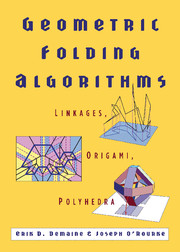Preface
Published online by Cambridge University Press: 07 September 2010
Summary
At how many points must a tangled chain in space be cut to ensure that it can be completely unraveled? No one knows. Can every paper polyhedron be squashed flat without tearing the paper? No one knows. How can an unfolded, precreased rectangular map be refolded, respecting the creases, to its original flat state? Can a single piece of paper fold to two different Platonic solids, say to a cube and to a tetrahedron, without overlapping paper? Can every convex polyhedron be cut along edges and unfolded flat in one piece without overlap? No one knows the answer to any of these questions.
These are just five of the many unsolved problems in the area of geometric folding and unfolding, the topic of this book. These problems have the unusual characteristic of being easily comprehended but they are nevertheless deep. Many also have applications to other areas of science and engineering. For example, the first question above (chain cutting) is related to computing the folded state of a protein from its amino acid sequence, the venerable “protein folding problem.” The second question (flattening) is relevant to the design of automobile airbags. A solution to the last question above (unfolding without overlap) would assist in manufacturing a three-dimensional (3D) part by cutting a metal sheet and folding it with a bending machine.
Our focus in this book is on geometric folding as it sits at the juncture between computer science and mathematics.
- Type
- Chapter
- Information
- Geometric Folding AlgorithmsLinkages, Origami, Polyhedra, pp. xi - xivPublisher: Cambridge University PressPrint publication year: 2007



